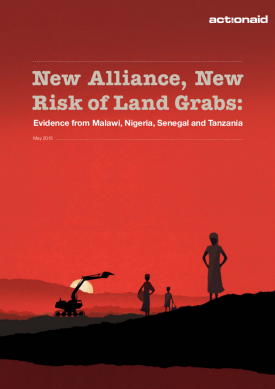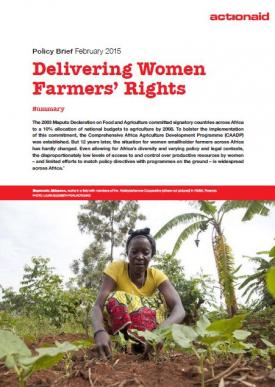Location
ActionAid is an international anti-poverty agency whose aim is to fight poverty worldwide. Formed in 1972, for over 30 years we have been growing and expanding to where we are today - helping over 13 million of the world's poorest and most disadvantaged people in 42 countries worldwide.
In all of our country programmes we work with local partners to make the most of their knowledge and experience.
Resources
Displaying 21 - 25 of 53Secure and equitable land rights in the Post- 2015 Agenda: A key issue in the future we want
The Post-2015 Agenda must address the structural factors that undermine sustainable development. It is widely recognised that secure and equitable rights to land and natural resources are central to this effort. Land rights empower people and provide a sense of dignity. They enhance food security and are fundamental to achieve the right to food and increase the productivity of small-scale food producers. They provide an incentive for ecosystem stewardship, and they promote inclusive and equitable societies whilst underpinning cultures and value systems.
New Alliance, New Risk of Land Grabs
Ten African countries have signed up to the New Alliance for Food Security and Nutrition – the G8 countries’ main strategy for supporting agriculture in Africa that was launched in 2012. As the New Alliance has been under way for three years, some of its likely impacts are becoming clearer. This briefing – covering Nigeria, Malawi, Tanzania and Senegal – shows that some large companies involved in the New Alliance are already accused of taking part in land grabs in some countries.
Cambodia: The Bitter Taste of Sugar - Displacement and Dispossession in Oddar Meanchey Province
In 2008, three sugar companies were awarded nearly 20,000 hectares of Economic Land Concessions (ELCs) in Oddar Meanchey province.
The new research finds that associated land grabbing totaling more than 17,000 hectares has affected more than 2,000 families. Of these, 214 families were forcibly evicted.
Meanwhile, at least 3,000 hectares of the misappropriated land has been used for logging rather than sugar plantations, according to the report, ‘Cambodia: The Bitter Taste of Sugar’, commissioned by ActionAid and Oxfam GB.
Act On It! Four key steps to stop land grabs
Over the past 15 years, tens of millions of hectares of land have been acquired by large investors in developing countries. The Land Matrix documented 1,037 transnational land deals covering 37,842,371 hectares during this period, while many more deals remain undocumented.1 This global land rush is causing widespread forced evictions and denial of access to key land and natural resources for millions of women, small- scale food producers, pastoralists, gatherers, forest dwellers, fisherfolk, and tribal and indigenous peoples.
Policy brief: delivering Women farmers' right
The 2003 Maputo Declaration on Food and Agriculture committed signatory countries across Africa to a 10% allocation of national budgets to agriculture by 2008. To bolster the implementation of this commitment, the Comprehensive Africa Agriculture Development Programme (CAADP) was established. But 12 years later, the situation for women smallholder farmers across Africa has hardly changed.








